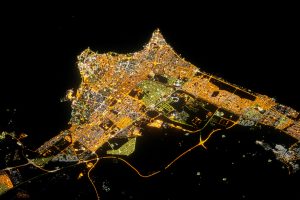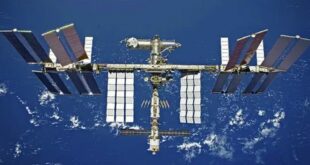
Several weeks ago SpaceWatch Middle East contributor Ghanim Alotaibi, a Kuwaiti engineer and Space Generation Advisory Council member, wrote of the need for a Kuwaiti space programme, but that such an endeavor faces several challenges, starting with the challenge of ‘Kuwaitisation’. This week, Ghanim address the other three challenges Kuwaiti leaders will have to address when creating a Kuwaiti space programme.
This is the second part of my “Challenges and Opportunities For a Kuwaiti Space Programme.” In part one, I provided my perspective on the challenge of involving Kuwaitis in a future Kuwaiti space programme. Here, in part two, I am going to discuss the three other challenges that face the establishment of a sustainable and substantive Kuwaiti space programme.
Kuwaiti scientific contribution to the international community is insignificant
Exploiting space for the promotion of science and engineering has always been a major outreach theme for space programmes. Countries like Kuwait probably need more outreach campaigns like these, but, for Kuwait the promotion of science and engineering among the public should extend to more than just an outreach campaign of a space programme.
As I described in part one, there is an ongoing challenge of ‘Kuwaitisation’ in all major Kuwaiti economic, technical, and scientific sectors – not just its space and satellite sector – and this holistic, interconnected complexity applies to the other challenges of establishing a Kuwaiti space programme. In light of this, I ask the following question:
Kuwait has a huge oil infrastructure, amazing desert and coastline, and many archaeological sites to be excavated and studied, yet why has Kuwait never advanced on these and other fields from a scientific and engineering perspective? In other words, the need for scientific and engineering skills in Kuwait is so huge and obvious, yet why haven’t we seen real advancements in these fields led by Kuwaitis?
The above is indeed a difficult question to answer. But, I would say, from my humble perspective, that there are two main reasons:
- The general lack of awareness of the importance of science among the Kuwaiti public that science is crucial for the advancement of Kuwaiti society and to improve the quality of life. This is especially the case when speaking about the hard sciences – physics, chemistry, and biology – that are the basis of applied sciences.
- The existence of a large and effective scientific community within a country has social, economic, and political implications that have disruptive consequences and effects. The existence of a flourishing scientific community will inevitably disrupt social, economic, and political systems. This kind of disruption is not favoured by some in Kuwait.
Space has always inspired people regardless of their culture. A Kuwaiti space programme, therefore, could be the basis for a systematic Kuwaiti outreach programme intended to convince the public of the importance of science in Kuwait’s future, and that there are career opportunities available for Kuwaiti scientists and engineers in the space programme and other sectors. But, an outreach programme is not enough.
Kuwait should create a vision and a strategy that extends to every scientific and engineering field in the country for the promotion of science. A space programme is just one of those fields. Energy, geology, oceanography, archeology, and many other fields, should be included in a vision and strategy of integrating real scientific work done by Kuwaitis for the benefit of their country.
The lack of such a vision and strategy will not only affect the long-term sustainability of establishing a Kuwaiti space programme, but will also cost the country dearly in every other field of scientific and technical endeavour. As a young Kuwaiti, I would say that the lack of a national vision to promote science in every field of importance to Kuwait will temper the excitement of establishing a space programme, as well as severely limit its potential. I can’t imagine a successful space programme in any country without real science and engineering efforts done in other fields.
A Kuwaiti space programme and the world
A Kuwaiti space programme should not be isolated from the worldwide effort to colonise space. Nor should a Kuwaiti space programme reinvent the wheel. Nor should it go it alone to space. Kuwait maintains good diplomatic relations with almost all countries in different fields. But here, I am not talking only about cooperation, but to find a niche somewhere among the scientific efforts of the world when going to space.
For example, we see that there are big moves underway for lunar and asteroid mining missions, or a new space station that will replace the International Space Station (ISS) in order to maintain a human presence in space. Among these futuristic visions – which other spacefaring countries are already seriously working on – Kuwait should select one unique area and integrate it with global efforts. In other words, a Kuwaiti space programme should add something unique and valuable to the world space community that at the same time will add something valuable and beneficial to Kuwait. Therefore, it is very important that decision makers in Kuwait review future space missions led by the major spacefaring countries of the world in order to understand where Kuwait might make a unique, meaningful, and beneficial contribution. Perhaps a good example to mention here is the CanadaArm on the ISS. The Canadian contribution to the space community through the robotic arm on the ISS is significant and notable.
Space and scientific cooperation with Gulf Cooperation Council (GCC – Saudi Arabia, Kuwait, Oman, Qatar, Bahrain, and the United Arab Emirates) countries is worth mentioning here as well. The GCC has acted in concert and unison in many regional security and economic activities, as well as in trade, economic and other important policy issues among the six member states. Finding a common GCC contribution to global space science and exploration efforts might be achieved more efficiently and for the greater good if the six states cooperated through already well-established GCC channels and institutions. There will be extra complications for this type of cooperation, but I believe the rewards are worth the extra work.
Kuwait and space commercialisation
For several years now the Kuwaiti government and media have been encouraging Kuwaitis to go to the private sector, either by establishing new startups or by working as employees.
The idea of establishing space startups will be very exciting for many young Kuwaitis. The establishment of a space programme in Kuwait can definitely help in shifting a significant number of the Kuwaiti population to the private sector, and such small companies would need to be motivated and supported by officials representing the space programme of Kuwait. A Kuwaiti space agency should organise seminars and courses that facilitate new startups as well as clarify what opportunities there are for investors. This way, Kuwaiti space commerce activities could also attract big capital that adds to the Kuwaiti economy. This in turn should help efforts to diversify the Kuwaiti economy. The policy challenge for Kuwaiti officials, however, is to balance competition between large companies and small, new companies.
Conclusion
There is a compelling case for a Kuwaiti space programme, and in both of my essays I have described the four challenges – Kuwaitisation, meaningful scientific vision and strategy, sustainable and unique international contributions and cooperation, and space commercialisation – that Kuwaiti leaders and official should consider when establishing such a programme. These four challenges already exist within Kuwaiti institutions and are not new, but the establishment of a Kuwaiti space programme would provide an opportunity to deal with them. It will not be enough to just create a space programme that is not linked to broader and long-term strategic and policy goals that promote a flourishing scientific renaissance in Kuwait and beyond. Kuwait’s youth, and its future, depend upon this.
Ghanim Alotaibi graduated as a mechanical engineer from Kuwait University in 2009. He then started working for Kuwait Oil Company for the next six years. As well as working at KOC, Ghanim obtained an astronomy degree from Swinburne University in Melbourne, Australia. Ghanim is currently doing his Master’s thesis on Photovoltaics at the Fraunhofer Institute in Freiburg, Germany.
Since being an undergraduate student, Ghanim has been an active space enthusiast. In 2009, Ghanim presented a paper reflecting a young perspective on establishing a space programme in Kuwait at the Committee on the Peaceful Uses of Outer Space (COPUOS). Ghanim is also a member at the Space Generation Advisory Council (SGAC) and is involved in some space projects.
Original published at: http://spacewatchme.com/2016/10/challenges-opportunities-kuwaiti-space-programme-part-ii/
 SpaceWatch.Global An independent perspective on space
SpaceWatch.Global An independent perspective on space

